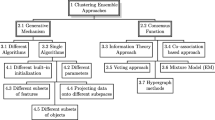Abstract
Traditional data manipulation models such as Bagging and Boosting select training cases from throughout the problem space to generate diversity and improve performance. A new data manipulation model is proposed that dynamically assigns specialists to train on difficult clusters of training data. The model allows the expertise of specialists to overlap for difficult regions of the problem. It has been coupled with a dynamic combination model to exploit the diversity of specialist members. The model has been applied to an environmental problem and has demonstrated that dynamic modelling can enhance both the diversity of members and the accuracy of the ensemble.
Preview
Unable to display preview. Download preview PDF.
Similar content being viewed by others
References
Kuncheva, L.: That elusive diversity in classifier ensembles. In: IbPRIA. First Iberian Conference on Pattern Recognition and Image Analysis, pp. 1126–1138 (2003)
McQueen, J.: Some methods of classification and analysis of multivariate observations. In: 5th Berkeley Symp. on Mathematical Statistics and Probability, pp. 281–297 (1967)
Cover, T., Hart, P.: Nearest neighbour pattern classification. IEEE Transactions on Information Theory 13(1), 21–27 (1967)
Breiman, L.: Bagging predictors. Machine Learning 24(2), 123–140 (1996)
Freund, Y., Schapire, R.: Experiments with a new boosting algorithm. In: Machine Learning. Proceedings of the Thirteenth International Conference on Machine Learning, pp. 148–156. Morgan Kaufmann, San Francisco (1996)
Jacobs, R., Jordan, M., Nowlan, S., Hinton, G.: Adaptive mixtures of local experts. Neural Computation 3, 79–87 (1991)
Spencer, M., Whitfort, T., McCullagh, J., Bui, E.: Dynamic ensemble approach for estimating organic carbon using computational intelligence. In: ACST 2006 (2006)
Climate Change Science Program: Strategic plan for the U.S. climate change science program. Technical report (2003)
Johnston, R., Barry, S., Bleys, E., Bui, E., Moran, C., Simon, D., Carlile, P., McKenzie, N., Henderson, B., Chapman, G., Imhoff, M., Maschmedt, D., Howe, D., Grose, C., Schoknecht, N., Powell, B., Grundy, M.: ASRIS: The Database. Australian Journal of Soil Research 41, 1021–1036 (2003)
Henderson, B., Bui, E., Moran, C., Simon, D.: Australia-wide predictions of soil properties using decision trees. Geoderma 124, 383–398 (2004)
Quinlan, J.: Learning with continuous classes. In: 5th Australian Joint Conference on Artificial Intelligence, pp. 343–348. World Scientific, Singapore (1992)
Author information
Authors and Affiliations
Editor information
Editors and Affiliations
Rights and permissions
Copyright information
© 2006 Springer-Verlag Berlin Heidelberg
About this paper
Cite this paper
Spencer, M., McCullagh, J., Whitfort, T. (2006). Clustering Data Manipulation Method for Ensembles. In: Sattar, A., Kang, Bh. (eds) AI 2006: Advances in Artificial Intelligence. AI 2006. Lecture Notes in Computer Science(), vol 4304. Springer, Berlin, Heidelberg. https://doi.org/10.1007/11941439_134
Download citation
DOI: https://doi.org/10.1007/11941439_134
Publisher Name: Springer, Berlin, Heidelberg
Print ISBN: 978-3-540-49787-5
Online ISBN: 978-3-540-49788-2
eBook Packages: Computer ScienceComputer Science (R0)




